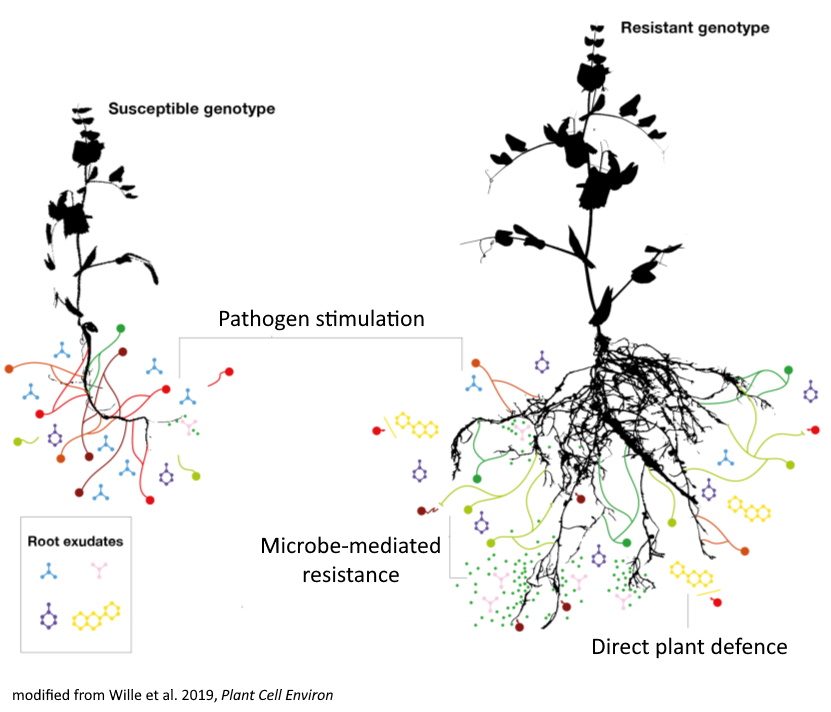The workshop aims to strengthen a network among plant breeders and scientist of different disciplines to explore the use of plant-microbe interactions in plant breeding.
Plant-associated microbes have received considerable attention in research for their ability to improve crop productivity and yield stability. Knowledge on plant genetic determinants for beneficial interactions with individual microbes (incl. biologicals) and entire communities is growing rapidly. Several reports indicate that not only the host species but also the host
genotype play a significant role in driving microbial community composition and activity, selecting for and against particular members of the microbial community. However, to what extent genetic factors are responsible for shaping beneficial plant microbiomes is still poorly
understood. Similarly, plant microbiome manipulation via the introduction of biologicals offers great promise, but still suffers from variable outcomes due to insufficient knowledge of the factors involved for successful applications. In conclusion, there are still many uncertainties on how to implement this knowledge into plant breeding and propagation
programmes.
The Workshop is organised by the EUCARPIA Working Group on plant-microbe Interactions of the Section Organic and Low-Input Agriculture and will continue to discuss the potential and limitations of implementing the growing knowledge on plant-microbe interactions in plant breeding. The 2nd workshop in 2019 led to fruitful discussions on related opportunities
and challenges, e.g. emphasising the importance of high-throughput phenotyping, modelling, genetic markers, standards for -omics protocols, microbiome functions (beyond description) and decision tools for genotype selection. The workshop outputs were synthesized in a perspective article on emerging research priorities towards microbe-assisted crop production
(Hohmann et al. 2020, FEMS Micr. Ecol).
This year’s 3rd EUCARPIA workshop will continue the discussion and foster the dialogue between the different research disciplines and industry in order to develop advanced breeding strategies for future resilient agroecosystems.
Session I: Genetic determinants of plant-microbe interactions
Keynote: Victor Carrion (Assistant Professor, Leiden University).
Victor leads the group of Metagenomics and Plant-Microbe Interactions at Leiden University where his research focuses on understanding the underlying mechanisms of plant protection against (a)biotic stresses mediated by microorganisms, and the use of bioinformatic tools for the prediction of bacterial lifestyles. His work has significantly contributed to the understanding of genotype-dependent effects on rhizosphere microbiome assembly and disease-suppressive functions in the endophytic root microbiome.
Session II: Integration of plant-microbe interactions into breeding
Keynote: Eveline Adam (Head of Oil Pumpkin and Legume Breeding, Saatzucht Gleisdorf).
Eveline leads the oil pumpkin and legume breeding programme at Saatzucht Gleisdorf. She combines classical resistance breeding approaches with bioinoculation and metabarcoding to analyse rhizosphere and seed microbial communities instead of focusing on pathogens alone. Her work has set the foundation for microbiome-assisted breeding and seed production in Styrian oil pumpkin.
Registration: Only registration to workshop, please click 'Subscribe'.
For miCROPE participants, please register via the miCROPe website until July 3, 2022.
NEW DEALINE ABSTRACTS SUBMISSION
Submit abstracts until May 24, 2022: See workshop flyer.
Workshop direction: Pierre Hohmann, IRTA / Friederike Trognitz, AIT / Monika Messmer, FiBL.

Leave us your Email address so we can let you know when the registration process starts.
